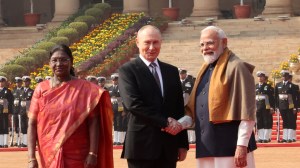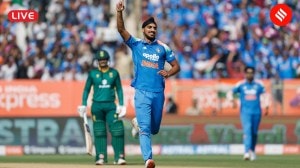Fuelled by mascot Mukul Sangma, TMC throws down gauntlet to NPP in battleground Meghalaya
The home turf of both Mukul Sangma and CM Conrad Sangma, Garo Hills, which elects 24 MLAs, will witness a fierce contest between their parties
 Mukul Sangma has been the Chief Minister 2010-2018) Facebook: Mukul Sangma
Mukul Sangma has been the Chief Minister 2010-2018) Facebook: Mukul Sangma It is not difficult to locate any address in Tura, the small hill town in the heart of Meghalaya’s Garo Hills. However, queries about directions for the local Trinamool Congress (TMC) office are met with blank faces.
“Oh, you mean Dr Mukul Sangma’s office?” asks a traffic cop after betraying confusion for several seconds when asked about the TMC office.
In the Garo Hills, Leader of the Opposition (LoP) and ex-chief minister Mukul Sangma and the TMC are synonymous – so much so that the Mamata Banerjee-led party’s entire plunge into the Meghalaya fray for the 27 February Assembly polls is centred on Mukul’s leadership.
“Without Mukul, TMC is nothing,” said a 40-year-old shopkeeper in Tura Bazar, the town’s commercial nerve centre.
In November 2021, the TMC had made a splash in Meghalaya politics when 12 of the 17 Congress MLAs, led by Mukul, defected to its fold. The Bengal-based party, which did not have any base in Meghalaya till then, thus became the principal Opposition in the state overnight.
With the Congress still tottering and the BJP trying to find its feet, the TMC has been going all out to emerge as the principal challenger to Chief Minister Conrad Sangma-led National People’s Party (NPP) in this election.
Besides Mukul Sangma, the Garo Hills, which elects 24 of the state’s total 60 MLAs, is also Conrad Sangma’s home turf. The region is thus set to witness a fierce contest between the NPP and the TMC in the polls.
Political observers say its performance in the Garo Hills would be crucial in determining whether the TMC is able to emerge as a formidable political force in the state. Mukul himself is contesting from two constituencies here: his old constituency, Songsak, and Tikrikilla in the plains.
Not surprising, the TMC has been campaigning vigorously across the Garo Hills. Tura is swarming with young employees of the Indian Political Action Committee (IPAC), the political consultancy founded by Prashant Kishore, which the TMC has hired to manage its campaign.
“We have been camping here for months,” said an IPAC staffer. “The point is to meet people on the ground and dispel their apprehensions that TMC is a Bengali party.”
The “Bengali party” jibe has constantly followed the TMC as it seeks to expand its footprint in this largely tribal Northeastern state. In their electioneering, political rivals have been engaging in a war of words over it.
In January, Mukul accused Conrad of allegedly using a racial slur after the latter used the word “Bengali” in his speech to attack the TMC. Conrad hit back, saying he had said the “Bengal-based party and not Bengali”.
Last week, Union Home Minister Amit Shah waded into the row and asked, while addressing a rally in Garo Hills, “You live near the Bangladesh border, tell me – if the TMC comes here, will infiltration increase or decrease?”
However, on the ground in the Garo Hills, the TMC’s origin seems to hardly matter as for most people it is all about Mukul.
In the Selsella constituency, T Marak, a government school headmaster, insisted that “people are not looking where it (TMC) has come from”. “In conversations, people talk only of Mukul, not TMC,” he said. “He is a purana khiladi (seasoned player).”
Echoing such views, a Tura-based entrepreneur said, “Even P A Sangma was with TMC at one point – did it matter? Not at all.”
The two-time CM, Mukul, 57, has been among the most prominent names in Meghalaya politics in recent decades – perhaps second to only late P A Sangma, Conrad’s father and former Lok Sabha Speaker and CM. Many even say that following P A Sangma’s demise Mukul has possibly become the most pre-eminent leader in the state
A popular medical doctor by profession, Mukul’s support base transcends ethnic divides, a rarity in a state where ethnicity often plays a major role in politics.
A TMC worker in Rajabala, Babul Sarkar, admitted, “Yes, it is true…Without Mukul, there would be no campaign.” As a veteran journalist from Garo Hills puts it, “Let Mukul stand from any party and he will win.”
In the Garo Hills’ plains spanning several constituencies including Phulbari, Tikrikilla, Rajabala, Selsella, Ampati and Mahendraganj, Mukul also enjoys the backing of non-tribal communities, which account for a significant percentage of the local population.
“He has resonance among minorities too,” said Mojial Haque, a Bengali Muslim from Tikrikilla. What also helps him in this regard, observers say, is the TMC’s influence with the minority communities.
It is widely believed that the Mukul factor will not be limited to his two seats, but also play out in the constituencies from where his several family members, including his wife, daughter, brother and sister-in-law, are contesting.
Some observers say that the TMC’s strength is also its weakness though, pointing out that beyond Mukul’s personal appeal the party has little else to show. Much of it has to do with how electoral politics works in Meghalaya, which is essentially personality-oriented. For the TMC, there are very few such faces save Mukul. In the Khasi Hills, for instance, ex-speaker Charles Pyngrope is the party’s key leader – but his influence does not extend beyond two seats there.
Even many TMC leaders recognise it as a problem for the party, especially in the Khasi-Jaintia belt that elects 36 MLAs. “Unless we have a good face, the parties are not much of a help. The seats TMC gets in the Khasi Hills will be entirely based on the standing of the local candidates,” said a senior TMC leader.
However, several TMC workers claim that no party had “organised as much as TMC” at the grassroots level in this election. SN Sangma, the party’s Tura unit convener, said while it was “not easy” in the beginning, the party worked hard to activate the booth-level leadership in the last two years. Sarkar, the party worker from Rajabala, added that they had been going door-to-door and explaining to people the benefits of signing up for the “WE card” and the “MYE card” – the two cash assistance schemes the party has announced for women and youth as part of its poll promises.
West Bengal CM and TMC supremo Mamata Banerjee has made at least three visits to the state ahead of the polls, while party national general secretary Abhishek Banerjee has made multiple trips so far.
What has however queered the pitch for the TMC in a few belts is the Congress. While it has shrunk, the grand old party still commands public support in some pockets. The BJP, too, appears to be in a relatively stronger position this year, its prospects boosted by both Prime Minister Narendra Modi and Shah’s bids to hit the campaign trail. This, some observers say, may lead to the anti-NPP votes being split. An ex-Congress worker, who is now with the TMC, said: “If Mukul had not left the Congress, there would be a strong Opposition. Now that the votes are likely to be split, it gives the NPP an advantage.”
- 01
- 02
- 03
- 04
- 05































